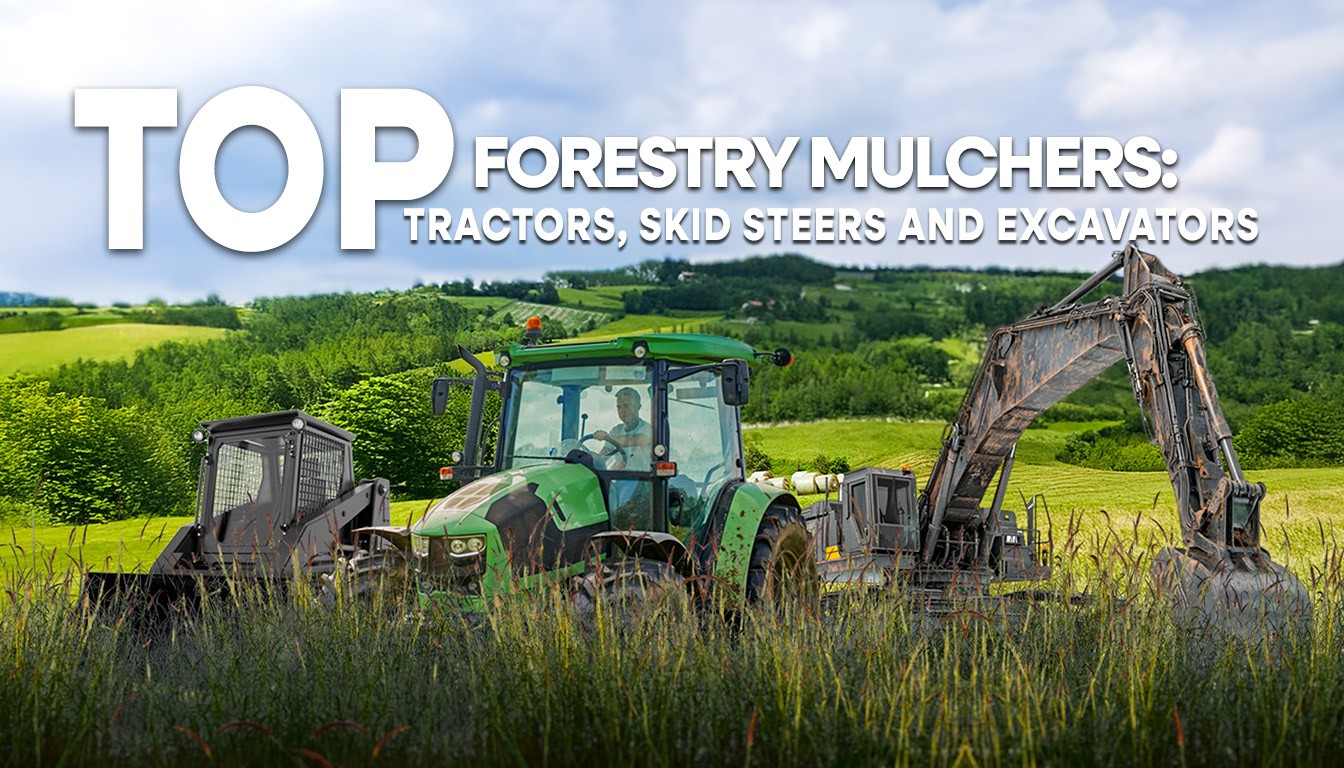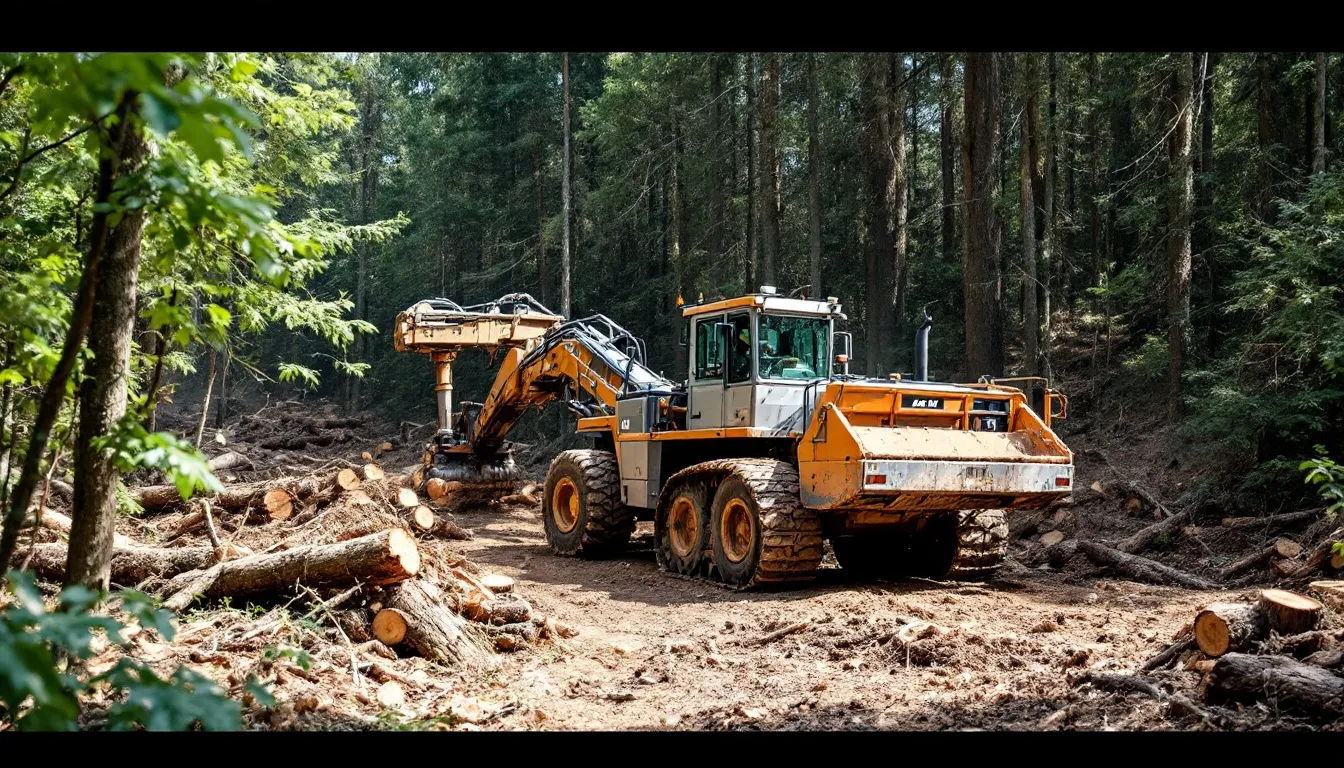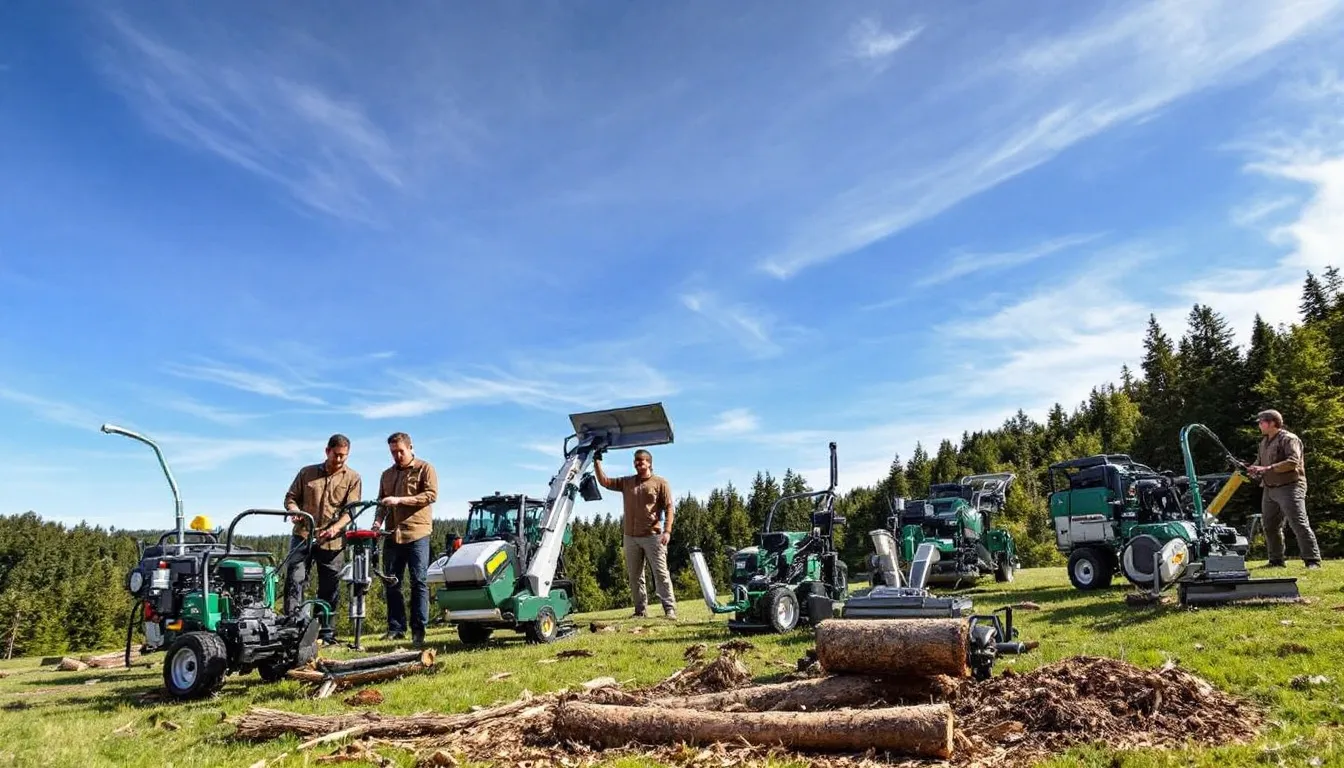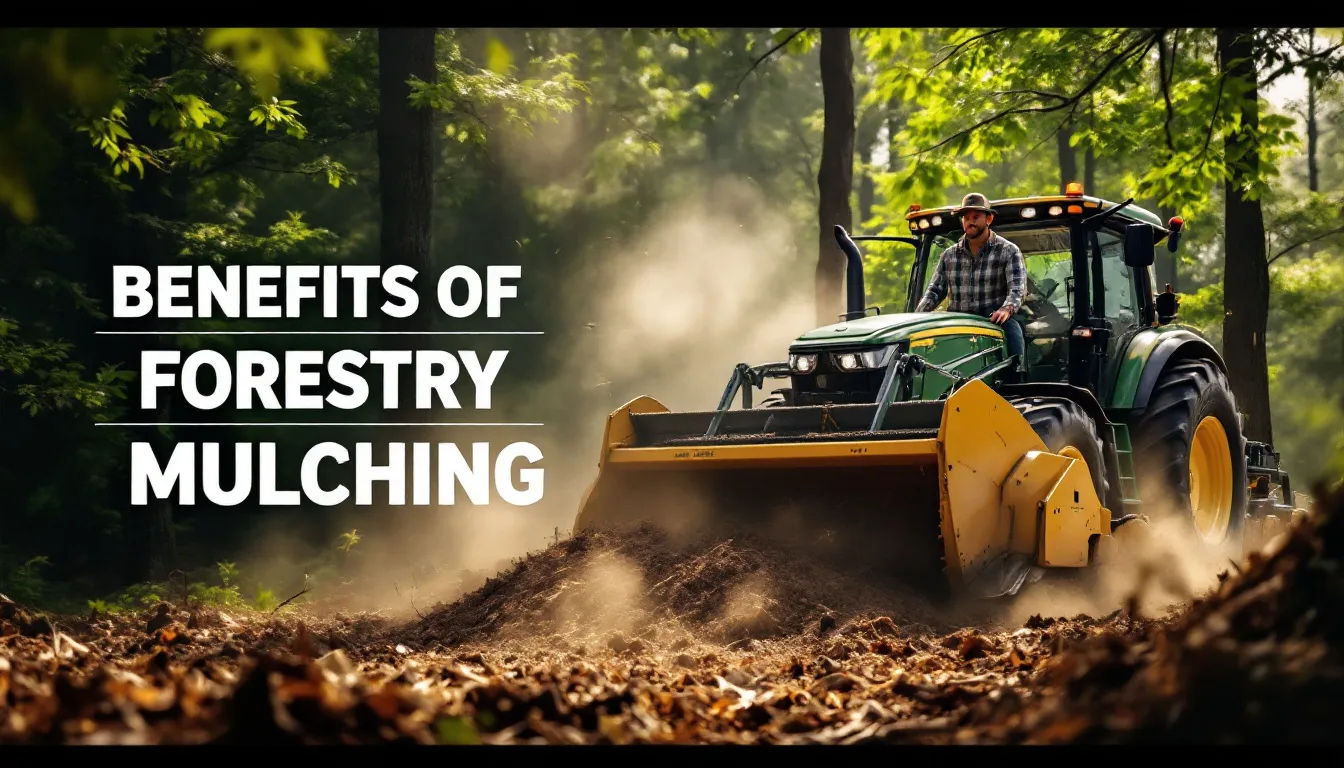Need to clear land fast and efficiently? Forestry mulchers can help by grinding trees and brush into manageable mulch. In this article, discover the best forestry mulchers for tractors, skid steers, and excavators, and find the perfect one for your project.
Key Takeaways
- Forestry mulchers are versatile machines that can be paired with different equipment, effective in clearing diverse vegetation and enriching soil through mulch.
- There are three main types of forestry mulchers—drum, disc, and deck—each suited for specific applications and land management tasks.
- Choosing the right forestry mulcher involves evaluating cutting capacity, hydraulic power, durability, and safety features to meet specific project needs.
Overview of Forestry Mulchers
Forestry mulchers are designed to clear brush, trees, and vegetation by grinding them into mulch, which is essential for cleaning and maintaining forests.
These machines can be paired with various equipment, including:
- Tractors
- Excavators
- Mini excavators
- Skid steers
This versatility makes forestry mulchers a valuable asset for a wide range of land management tasks.
Whether you’re dealing with dense undergrowth, standing trees, or invasive species, forestry mulchers provide an efficient solution. Their ability to convert vegetation into mulch not only clears the land but also enriches the soil, promoting healthier plant growth and reducing erosion.
Exploring the types of forestry mulchers will clarify which one fits your specific needs best.

Types of Forestry Mulchers
Forestry mulchers are primarily categorized into three types: drum mulchers, disc mulchers, and deck mulchers. Each type has its unique features and applications, making them suitable for various environments such as agricultural lands, utility corridors, and forest management areas.
Knowing the differences between these types aids in choosing the right mulcher for your project.
Drum Mulchers
Drum mulchers are built with high-strength steel-body construction, ensuring durability even in the toughest conditions. Designed to be compatible with 700-Series and 800-Series compact track loaders and skid-steer loaders with high-flow hydraulics, these mulchers offer robust performance and versatility. They come in various cutting widths, such as 50-inch, 61-inch, and 72-inch, to suit different land-clearing needs.
The operation of drum mulchers involves teeth on a rotor drum, which effectively shred trees and brush into mulch. This method allows for efficient clearing of dense vegetation and underbrush. A standout feature in some models, like the Mastodon mulcher, is the inclusion of the largest hydraulic motor available on any skid steer mulching head, enhancing its performance and making it a powerful tool for extensive land-clearing projects.
Drum mulchers are particularly effective for land clearing, forestry maintenance, and removing underbrush. Their ability to handle both large and small materials makes them a versatile choice for various conditions. A drum mulcher effectively transforms thick undergrowth or larger trees into manageable mulch.
Disc Mulchers
Disc mulchers utilize a series of sharp, rotating discs to cut and shred vegetation, making them highly efficient for various land-clearing projects. These mulchers are particularly effective in challenging terrain and can handle larger debris compared to traditional methods. One of the main advantages of disc mulchers is their ability to produce finer mulch, which can improve soil moisture retention and reduce erosion.
Ideal for applications such as land clearing, site preparation, and maintaining right-of-ways, disc mulchers offer significant benefits in forestry operations. They assist in managing brush and small trees, enhancing overall landscape health. Producing finer mulch, disc mulchers enhance soil quality and support sustainable land management.
Deck Mulchers
Deck mulchers are equipped with swinging blades that are effective for quickly clearing dense undergrowth. These machines are designed for rapid clearing of brush, providing a medium finish that is suitable for many land management applications. Their versatility makes them a popular choice among land managers and operators.
Deck mulchers are valuable for clearing underbrush and providing a medium finish. Whether you’re preparing land for agriculture or maintaining utility corridors, these mulchers offer a combination of speed and efficiency.
Their ability to quickly clear large areas of vegetation makes them an essential tool for land managers looking to maintain and improve their landscapes.
Key Features to Consider When Choosing a Forestry Mulcher
Evaluating cutting capacity, hydraulic power, durability, and maintenance needs is crucial for selecting the right forestry mulcher. These features determine performance and efficiency, ensuring the mulcher meets your project requirements.
Safety features, such as reinforced cabins, emergency shut-off switches, and protection guards, are also essential to ensure standard consideration.
Cutting Capacity and Desired Finish
Cutting capacity is a critical factor in achieving the desired project outcomes. Drum mulchers, for example, can pulverize trees with a maximum diameter of up to 8 inches, making them suitable for tackling a range of vegetation. The ability to handle both large and small materials and produce a fine, even finish is essential for various land-clearing tasks. Different types of mulchers offer varying cutting and processing capabilities, which are crucial for specific project needs.
The finish quality of the mulched material is also important. While drum mulchers provide a fine finish, disc mulchers excel with standing trees but leave a coarser finish. Understanding these differences will help you choose the right mulcher type for your specific project requirements and desired outcomes.
Hydraulic Power and Efficiency
Hydraulic power is a significant factor influencing the performance of a forestry mulcher. The hydraulic horsepower delivered by the carrier machine plays a crucial role in the efficiency and productivity of the mulcher. Underestimating the required power can lead to equipment struggles with challenging vegetation, reducing overall effectiveness.
Choosing a mulcher with adequate hydraulic power ensures efficient operation and maximizes productivity. Matching the mulcher’s hydraulic needs with the carrier machine’s capabilities ensures optimal performance and efficiency in your projects.
Durability and Maintenance
Durability is a key consideration when choosing a forestry mulcher. Selecting a machine made from durable materials can result in lower maintenance needs and extended operational lifespans. Brands with established reputations for reliability can guide informed purchasing decisions, ensuring you invest in equipment that will withstand challenging conditions.
Reading feedback about forestry mulchers should focus on durability, efficiency, and ease of use. A reliable forestry mulcher can lead to long-term financial savings through reduced maintenance costs and increased productivity. Durable equipment offers peace of mind and boosts the efficiency of land management projects.
Applications of Forestry Mulchers
 Forestry mulchers effectively clear land and control vegetation, crucial for fire prevention by reducing flammable plants and creating moisture-retaining mulch.
Forestry mulchers effectively clear land and control vegetation, crucial for fire prevention by reducing flammable plants and creating moisture-retaining mulch.
These machines are also utilized in wildlife restoration efforts, maintaining habitats for various animal species. Eliminating invasive species, forestry mulching supports native plant growth and enhances biodiversity.
The mulch produced helps reduce soil erosion by creating a protective layer that retains moisture and prevents runoff. It also aids in storm debris cleanup by grinding fallen trees and branches into mulch.
Land Clearing
Understanding your specific land clearing tasks helps in narrowing down the choices of forestry mulchers. Choosing the appropriate mulcher type depends on the specific requirements of the land-clearing project. There are many models of forestry mulchers available for tractors, catering to various horsepower requirements for effective land clearing. A mulcher with insufficient power has difficulty handling tough vegetation. This results in slower progress and greater wear on the equipment.
Forestry mulchers are effective in applications such as forestry maintenance, removing stumps, and roadside vegetation management. Land clearing is a vital forestry operation that involves removing trees and underbrush to prepare land for agricultural or development purposes.
Firebreak Maintenance
Creating firebreaks using mulchers helps reduce wildfire fuel loads and manage fire risks by removing potential fuel sources. This process allows for quick and effective removal of combustible materials in fire-prone areas, minimizing the spread of wildfires. Factors such as vegetation density and maintenance of firebreaks are critical in evaluating clearing needs.
Forestry mulchers maintain firebreaks, ensuring long-term effectiveness. Regular maintenance of firebreaks with these machines helps keep the area clear of flammable vegetation, reducing the risk of wildfires and protecting valuable land and resources.
Vineyard Maintenance
In vineyards, forestry mulchers manage undergrowth and promote healthier grape growth by clearing unwanted vegetation. These machines assist in managing excess vegetation, which can lead to improved grape production. Controlling weed growth and managing cover crops, forestry mulchers boost grape yield and vineyard health.
Forestry mulchers also help manage inter-row vegetation and mulch pruning residues, promoting healthy crop growth and reducing manual labor. Their effectiveness in vineyard maintenance makes them a valuable tool for land managers looking to optimize their agricultural practices.
How to Select the Right Forestry Mulcher for Your Needs
 Choosing the right forestry mulcher is essential for effective land-clearing projects. Both professional contractors and property owners can benefit from selecting the right forestry mulcher. Key factors to assess when picking a forestry mulcher include specific project needs and evaluating various brands and models.
Choosing the right forestry mulcher is essential for effective land-clearing projects. Both professional contractors and property owners can benefit from selecting the right forestry mulcher. Key factors to assess when picking a forestry mulcher include specific project needs and evaluating various brands and models.
Compatibility with existing equipment is crucial for effective operation. Hydraulic power efficiency should also be considered to maximize the performance of the mulcher. Selecting the wrong type of forestry mulcher can hinder work efficiency.
Assessing Your Land Clearing Requirements
When evaluating land clearing needs, it’s vital to consider specific project goals and vegetation density. Project goals may include clearing land for agriculture, construction, or forestry management. The carrier used for land clearing must have sufficient hydraulic flow and pressure for effective operation.
Proper evaluation of these factors ensures the selection of the right tools and techniques for successful land clearing. By understanding the specific requirements of your project, you can choose a forestry mulcher that meets your needs and maximizes efficiency.
Evaluating Different Brands and Models
Fecon is well-known for its high-quality forestry mulchers, making it a brand worth considering. Researching various brands ensures you select a high-quality forestry mulcher that meets your needs. Comparing different brands and models can provide insights into their features, durability, and performance through user reviews and specifications.
By evaluating multiple brands, you can make an informed decision that balances quality, performance, size, and cost. User reviews and detailed specifications clarify each model’s strengths and weaknesses, helping you choose the ideal option among various options.
Budget Considerations
A high-quality forestry mulcher enhances efficiency and effectiveness in land management projects. High-quality forestry mulchers save time and money in the long run by minimizing breakdowns and maintenance costs. Balancing initial costs with long-term savings is crucial when evaluating a forestry mulcher’s overall budget.
Consider the total cost of ownership, including potential operating savings, when assessing your budget for forestry mulchers. Investing in durable and efficient equipment will provide long-term benefits, making it a wise financial decision for your land management needs.
Common Mistakes to Avoid When Buying a Forestry Mulcher
Avoiding common mistakes can save you time, money, and frustration. One significant risk is overlooking safety features at the rear. This oversight can result in accidents and injuries. Equipping your forestry mulcher with safety features like reinforced cabins and emergency shut-off switches is crucial.
Additionally, ignoring a machine’s comfort can impact productivity by making you tired and less productive. Comfortable and ergonomic designs enhance operator performance, ensuring that the job gets done efficiently and safely. If you want to learn more about these designs, click here.
Benefits of Using Forestry Mulchers
 Forestry mulching is a time-efficient process, combining cutting, grinding, and disposal into one step. This efficiency significantly reduces operating costs due to lower labor and fuel expenses. Long-term cost savings often justify the initial investment in a more durable, high-quality forestry mulcher. These machines efficiently reduce vegetation to mulch, benefiting soil preservation and reducing erosion.
Forestry mulching is a time-efficient process, combining cutting, grinding, and disposal into one step. This efficiency significantly reduces operating costs due to lower labor and fuel expenses. Long-term cost savings often justify the initial investment in a more durable, high-quality forestry mulcher. These machines efficiently reduce vegetation to mulch, benefiting soil preservation and reducing erosion.
The demand for forestry mulchers is rising due to their role in sustainable land management and fire prevention. Beyond functionality, the visual appeal of landscapes can be enhanced through forestry mulching, making land management both functional and aesthetically pleasing. Investing in a good mulcher not only makes economic sense but also contributes to a healthier environment.
Summary
Choosing the right forestry mulcher can significantly impact the efficiency and success of your land management projects. Understanding the different types of mulchers, key features to consider, and their various applications helps in making informed decisions. By avoiding common mistakes and recognizing the benefits of using forestry mulchers, you can enhance productivity, save on costs, and contribute to sustainable land management. Equip yourself with the knowledge and tools necessary to optimize your land-clearing efforts and achieve your project goals.
Frequently Asked Questions
What are the main types of forestry mulchers?
The main types of forestry mulchers are drum mulchers, disc mulchers, and deck mulchers, each designed for specific applications and terrain conditions. Choosing the right type will enhance your efficiency in land management.
Why is hydraulic power important for forestry mulchers?
Hydraulic power is crucial for forestry mulchers as it enhances their performance and efficiency, enabling them to tackle tough vegetation with ease. This capability is vital for effective land clearing and maintenance in forestry operations.
What should I consider when choosing a forestry mulcher?
When choosing a forestry mulcher, consider key factors such as cutting capacity, hydraulic power, durability, maintenance requirements, and safety features. These elements will ensure you select the right equipment for your needs.
How do forestry mulchers help in fire prevention?
Forestry mulchers effectively reduce wildfire risks by removing flammable vegetation and creating firebreaks. This proactive approach plays a crucial role in fire prevention.
What are the benefits of using forestry mulchers in vineyards?
Using forestry mulchers in vineyards enhances grape production by effectively managing undergrowth, controlling weeds, and mulching pruning residues, leading to improved maintenance and healthier vines.
